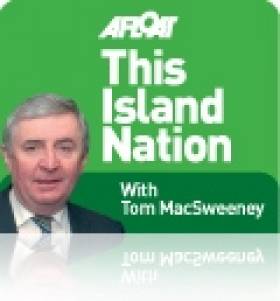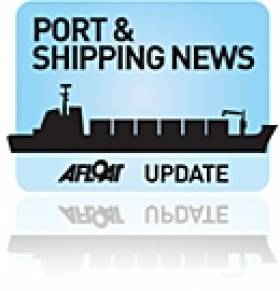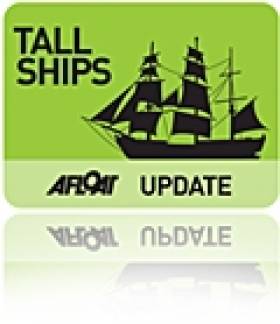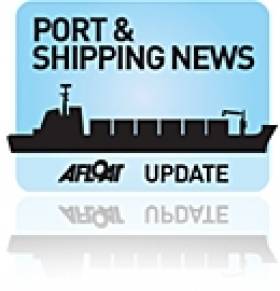Displaying items by tag: Ships
Massive Container Ships will Challenge Port Capacities
#islandnation – This week – massive container ships are on the way to challenge the port capacities .... Costa Concordia Captain speaks... Slavery for Irish seafarers... Time for environmentalists to talk to fishermen.... And much more....
THE NEW AGE OF MASSIVE CONTAINER SHIPS
Next July a container ship 400 metres long, that is 1,312 feet in length, known as a ULCV, an 'Ultra Large Container Vessel,' is due to be launched for the Maersk Shipping Line from the Daewoo Shipbuilding Yard in Seoul in South Korea. It will be 59 metres wide, 193 feet and draw a depth of 73 metres, 239 feet. The ship will be capable of carrying 18,000 containers. Maersk is the world's biggest container shipping company and intends to have 20 of these ships, Engine and hull designs will reduce CO2 emissions, it is claimed, by 50 per cent compared with the present industry average and reduce fuel consumption by utilising slow steaming methods.
These are massive vessels, called the 'Triple E' class for the three main purposes behind their creation:
• Economy of scale
• Energy efficiency
• Environmental Improvement
The 18,000 TEUs (twenty-foot containers) capacity will be 16 per cent greater than the largest vessel Maersk has at present. They set a new industry benchmark for size and fuel efficiency and will be the largest vessel of any type on the seas. The vessels are due to be delivered to Maersk this year between this year and 2015 and will change the face of container shipping dramatically. For container terminal ports they will be a huge challenge. The 'Container Supply Chain Asia Conference' in Hong Kong decided that ports worldwide would have to plan for crane and other infrastructural supports to accommodate such vessels and their container volumes and, with concerns expressed that some ports might never be able to handle them. But this is the way worldwide shipping of containers is going. As of this month there are 153 containerships on order with capacities in excess of 10,000 TEUs, including the 20 for Maersk. At present in worldwide shipping there are 121 vessels of 10,000 TEU capacity and above in service.
COSTA CONCORDIA CAPTAIN SPEAKS OUT
Captain Francesco Schetttino has spoken out for the first time since his cruise ship, the 'Costa Concordia,' sank off the coast of Italy a year ago with the loss of 32 lives. He told the UK shipping officers' union newspaper, the Nautilus Telegraph, that he hoped the tragedy would leave a legacy of improved safety. The 52-year-old Captain who is at the centre of a criminal investigation accusing him of manslaughter, causing a shipwreck and abandoning his vessel, said that he accepted his responsibilities. "But I am not a criminal. You cannot control things that are outside your control."
He has claimed that there are political reasons why a proper analysis of the accident has not been made public and said that he was confident the truth would come out and that he had not panicked after the grounding. He said he understood the reasons why the public wanted to have someone to blame, but he wanted people to have a better understanding of events on the night and of the pressures which modern Shipmasters have to work under.
The full interview is the front-page story in the February edition of the Nautilus Telegraph.
Fishing
EU GETS HUGE TRANSFER OF MONEY FROM IRELAND'S FISHING RESOURCES
I am tired of media reports that Ireland is a net beneficiary of EU funds when, at the same time, the general media makes no mention that EU nations get a huge transfer of money from catches which non-Irish EU fleets make in Irish waters. This is a transfer of funding from Ireland to the EU, without which the big fleets, such as Spanish, would not make their profits for the big Spanish companies. Let's have some media balance. That should be the basis of good journalism. Irish fishermen are subsidising benefits which other areas of Ireland get from the EU. That is the reality.
Marine Environment
GREENPEACE EUPHORIC ABOUT FISHING DECISION
The environmental organisation Greenpeace has described itself as "euphoric" about the decision by the European Parliament in supports of changes in fisheries regulations made last week. The Head of Greenpeace UK's Oceans Campaign, Willie Mackenzie, said he was euphoric about the reform measures passed by a majority of MEPs ... "the sort of reforms that us fish-heads could only have dreamed about a year ago."
However, his euphoria should be tempered by consideration of what the practicality of the European Parliament decision will mean for the fishing industry in Ireland and for fishermen, their families and fishing and coastal communities. There has, for too long, tended to be a one-sided debate on this subject with environmental lobbyists failing to take full account of what decisions actually mean. For a start, it will be the Council of Ministers which decides on fishing regulations and the sight of decaying Irish ports because of the effects of the discredited Common Fisheries Policy, is not one I like to see. Everyone does not live in urban centres and should not.
The main aims of the changes proposed - of rebuilding fish stocks to sustainable levels; setting catch limits in line with the best scientific advice; banning discards; prioritising access to those who fish in environmentally and socially beneficial ways and tightening the rules on how EU vessels fish in distant waters are targets with which there will be little, if any, disagreement from genuine fishermen whose livelihoods will only continue if there are sufficient fish in the sea. But environmental bodies have not given fair recognition or respect to Irish fishermen who have led the way in conservation in areas such as the Celtic Sea.
A ban on discards won't solve a dysfunctional Common Fisheries Policy but may help advance methods of fishing that protect species where this is needed. One of the most practical steps forward would be for environmental organisations to respect fishermen and the fishing industry and the need for fish as a food for humans. There has been enough megaphone, strident comment, now is the time for practical discussion.
Marine History
IRISH GOVERNMENT NEGLECTED SEAFARERS MADE SLAVES BY NAZI GERMANY
Successive governments and politicians of this island nation have failed the maritime community on several occasions. They failed in a shocking way when the Government and a number of politicians of the time did not help Irish seafarers who they allowed to be turned into slaves! This story is shocking and, even this far removed from the time when it happened, should be brought to national attention and those who were responsible identified. Thirty-two Irish seafarers, entitled to the protection of their government, men from a neutral nation in World War Two, were callously abandoned to their fate by the Irish government of the time which raised no complaint with the Nazi German government that subjected them to conditions of great hardship in an SS slave labour camp from 1943 to 1945.
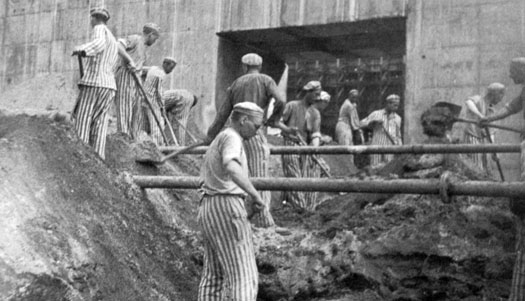
The photograph, Slave Labour in an SS camp, is reproduced courtesy of the publishers
The seamen concerned, only 27 of whom eventually returned to Ireland, are now acknowledged in Germany as a distinct group of victims of the Nazis. However, their suffering is still not recognised in Ireland, even though the principal reason they ended up as slave labour for the Nazis was because of their Irish nationality. When they returned to Ireland they were largely ignored. Their case has now been brought to light by David Blake Knox in his book – "Suddenly, While Abroad Hitler's Irish Slaves," published by New Island. The seamen were serving aboard merchant vessels. It is a book very well worth reading.
HISTORIC CORNISH FISHING BOAT SAVED
A unique piece of Cornish Maritime History is being saved. 'Dos Amigos,' believed to be St. Ive's sole surviving Carvel Gig, has a colourful history. It is thought to be the survivor of a class of St Ives boats known as 'Gigs'. They were open boats which fished under auxiliary motor and a fore and aft lugsail. 'Dos Amigos 'was built at the Paynter yard in 1920 for a local family and initially named 'Our Francis.' After 92 years as, first a well-maintained working fishing boat, then a converted gaff-ketch in Looe, she has fallen into disrepair, according to local sources, has been craned out of Looe Harbour and transported to the Treeve Boatyard in Hayle. The 38ft craft is one of renowned St. Ive's boat builder, Thomas Paynter's creations.
Dangerous Seas
How dangerous seafaring can be was underlined on Sunday when five crew of the 'Thomson Majesty' cruise ship were killed during a routine safety drill exercise after a lifeboat fell into the water from its position aboard ship whiled the vessel was in port in the Canary Islands. Three other crew were injured. About 1,400 passengers were on board at the time, but none of them were involved in the accident. An investigation is seeking to determine what caused the lifeboat to plummet into the water.
Email: [email protected]
Daily marine news on Afloat.ie
Follow on twitter @AfloatMagazine and Tom MacSweeney: @TomMacSweeney
Irish Ports Growth Levels Slowed in 2011
#PORTS – The pace of the volume recovery that began in 2010 for the Irish Ports and Shipping sector slowed last year with only one of the five principle cargo segments seeing any growth, according to the latest annual edition of the Irish Maritime Transport Economist, which was released at an industry briefing in Dublin, today (April 19th) by the Irish Maritime Development Office (IMDO).
The analysis highlights that only dry bulk volumes increased by 5% year on year, while unitised traffic on the main Roll-on/Roll-off routes were flat with no growth in 2011, and the Lift-on/Lift-off container sector endured its 4th consecutive decline, down by3%. Elsewhere oil tanker volumes declined 2% and break bulk fell by 3% to the year end.
The Irish ports and shipping sectors were confronted with a year of two distinct halves: 6 months of growth followed by 6 months of weaker demand. After a solid first quarter we witnessed clear evidence of shipping volume demand cooling over the remaining quarters. Shipping volume growth almost halved in the second quarter before turning flat to negative over the remaining quarter to the year end as the expectation about the pace of the global recovery, and also European sovereign debt issues, remained.
“The latest report again shows a strong correlation between developments in the real economy and the changing pattern of maritime traffic over the course of last year.” said IMDO Director Mr. Glenn Murphy. “We are optimistic, that despite the slowdown in the pace of the recovery last year, that most of the heavy volume losses have already been sustained, however the scope for growth this year remains limited and contingent on improved demand conditions in global markets. ”
The report does note that exports of container traffic to key overseas markets in the US and Asia increased by 5%, driven by the performance of the chemical, pharmaceutical and food & drink sectors, in particular dairy and meat exports. Traffic volume demand to and from the UK remained flat.
Providing the foreword to this years report, the Minister for Transport, Tourism and Sport, Leo Varadkar TD, commented “The efficient transport of goods into and out of the country is crucially important and supporting this is a key function of my Department. The development of a new ports policy will be of interest to those in the maritime transport sector. The existing ports policy is in need of a substantial overhaul. It is largely focused on corporate governance, it treats each of our nine port companies as though they were the same size and had the same role to play, and advocates a laissez faire approach by Government. It is my intention that, in the coming months, a new ports policy will be published and put in place”
The report concluded that the outlook for 2012 is for limited growth across the principal cargo sectors. Container imports from overseas markets recorded their 20th consecutive quarter of negative growth, which continues to provide logistical challenges for shipping lines seeking suitable container capacity to meet export demands. The continued rise of bunker/fuel prices which have grown by 40% over the past 12 months remains a constant challenge for owners and operators in all market segments.
Dublin to Welcome Tall Ships into the Bay in August 2012
For the first time since 1998, Dublin City will welcome back sailing's International Tall Ships Races, presented by Szczecin, Poland. As final host port for the 2012 Tall Ship Races, the event will see up to 100 Tall Ships sail into Dublin for a four day Festival and celebration, from Thursday the 23rd August to Sunday 26th August, 2012. Ships from as far away as Chile, Mexico, Argentina, USA and European and Baltic countries including Italy and Norway will chart their course to Dublin.
Over 5000 participants will compete in these "experience of a lifetime" races and there will be opportunities for young trainees from Dublin to be selected to participate in the races. The event offers young people a unique setting for developing essential life skills like team building, leadership, multi-cultural understanding and friendship with participants from up to 50 countries taking part.
The Lord Mayor said, "The visit of the Tall Ships to Dublin will be the biggest event in Ireland in 2012. It will provide a major boost to all city businesses and will enhance Dublin's position as a major International event destination. It should be great fun for everyone, young and old".
The next 18 months will see opportunities for businesses to get involved in sponsorship of the event such as the Trainee Recruitment Programme. These magnificent ships will also take bookings for corporate hospitality and it is expected that 1.5 million visitors from home and abroad will attend a full programme of activity and entertainment for all ages during the festival.
Commenting at the launch of the Tall Ships 2012, Mr. Enda Connellan, Chair of the Tall Ships Steering Group said, "When Dublin last hosted the Tall Ships Races in 1998 it reminded us all of the rich history and close associations between the port and the city that has grown up around it. When the Tall Ships return in August next year they will be greeted by a significantly altered skyline that now includes the Samuel Beckett Bridge, Dublin Convention Centre, the Spire, the Grand Canal Theatre and the O2. One million citizens visited the Tall Ships festival then and I have no doubt that many more will experience the carnival atmosphere when these magnificent sailing ships return to Dublin in 2012"
The races in 2012 will visit the ports of St. Malo in France, Lisbon in Portugal, Cadiz and La Coruna in Spain, from where they will set sail on the last leg of their races to their final host port, Dublin.
Eamonn O'Reilly, CEO of Dublin Port Company that manages Dublin Port said, "I am delighted to welcome the Tall Ships Races to Dublin Port, Ireland's premier port. The Port handles 50% of all Ireland's imports and exports, making it a significant facilitator of Ireland's economy. In addition it welcomes 1.7 million tourists through the ferry companies operating there and 2010 saw an additional 130,000 tourists and crew from the 85 cruise ship calls to the Port "
Looking for further reading on Tall Ships in Ireland? Click the links below:
Click this link to read all our Tall Ships Stories on one handy page
Previewing Ireland's Tall Ships 2011 Season
Can Ireland Get a New Tall Ship?
The UK's Maritime & Coastguard Agency (MCA) announced today that 4 foreign flagged ships were under detention in UK ports during June 2010 after failing Port State Control (PSC) inspection.
Latest monthly figures show that there were 2 new detentions of foreign flagged ships in UK ports during June 2010 and 2 vessels under detention from the previous month. The overall rate of detentions compared with inspections carried out over the last twelve months was 2.8% this is slightly down from May's twelve month rate.
During the month of June 171 Port State Control inspections were carried out in the UK. A total of 61 vessels had no deficiencies raised against them, 79 had between one and five deficiencies, 22 had between six and ten deficiencies, 9 had between eleven and twenty deficiencies and none of the vessels inspected had more than twenty deficiencies.
Out of the detained vessels, 2 were registered with flag states listed on the Paris MOU white list, none were registered with flag states on the grey list, 1 was registered with a flag state on the black list and 1 was not flagged.
1. In response to one of the recommendations of Lord Donaldson's Inquiry into the prevention of pollution from merchant shipping and in compliance with the EU Directive on Port State Control (95/21/EC as amended), the Maritime and Coastguard agency (MCA) publishes full details of the foreign flagged vessels detained in UK ports each month.
2. Inspections of foreign flagged ships in UK ports are undertaken by surveyors from the MCA. Where a ship is found to be deficient or lacks the required documentation, MCA surveyors can take a range of actions leading to detention in serious cases. The UK is part of a regional agreement on port state control known as the Paris Memorandum of Understanding on Port State Control (Paris MOU) and information on all ships that are inspected is held centrally in an electronic database known as SIReNaC. This allows the ships of flags with poor detention records to be targeted for future inspection.
3. Detained ships have to satisfy surveyors that remedial work has been carried out before they are allowed to leave port.
4. When applicable the list includes those passenger craft prevented from operating under the provisions of the EU Directive on Mandatory Surveys for the safe operation of regular Ro-Ro ferry and high speed passenger craft services (1999/35/EU).
Notes on the list of detentions
· Full details of the ship.
· The accompanying detention list shows ship's name, the flag state and the ship's International Maritime Organization (IMO) number which is unchanging throughout the ship's life and uniquely identifies it.
· Company.
· The company shown in the vessel's Safety Management Certificate or the party otherwise believed to be responsible for the safety of the ship at the time of inspection.
· Classification Society.
· The list shows the Classification Society responsible for classing the ship and not necessarily the party issuing and/or carrying out surveys for certificates relevant to the defect found.
· Recognised Organisation.
· The "organisation" - responsible for conducting the statutory surveys: and issuing statutory certificates, (on behalf of the Flag State).
· Defects.
· The list gives a summary of the main grounds for detention and includes information where the ship has been released to sail to another port for repairs.
Vessels detained in June included:
A 7,478 GT. passenger ship was detained in Belfast because the fire safety measures were inadequate and the maintenance of the ship and equipment was not in accordance with the Safety Management System. The vessel had previously been detained in the UK in May 2006.
SHIPS DETAINED IN JUNE 2010
Date & Place of detention: 02/06/2010 - BELFAST
Vessel Name: VISTAMAR (Passenger Ship)
GT: 7,478
IMO: No: 8701193
Flag: Italy
Company: SO. GE. VI. S.R.L.
Classification Society: Registro Italiano Navale (RINA)
Recognised Organisation: Registro Italiano Navale (RINA)
Recognised Organisation for ISM: Registro Italiano Navale (RINA)
Summary: 19 deficiencies, 4 grounds for detention.
The vessel was detained in Belfast for 4 days because fire doors were broken or missing, one fire door opening was restricted and numerous fire door latches were missing. Due to the number of deficiencies found, the maintenance of the ship and equipment was not in accordance with SMS.
Other deficiencies included: life jacket donning instructions were missing; on-board instructions for life saving appliances required updating; lifeboat instructions posted were incorrect; the public address system in the upper alleyways and cabins was inoperative and paint was stored incorrectly. In addition: there was a large bubble in the magnetic compass and the azimuth ring did not fit; portside liferaft emergency preparation light was not connected to the emergency system and was not marked; switches were inoperative for emergency overboard lights for liferafts and a test battery was missing for the emergency two-way communications.
The vessel was released on 05/06/2010.
Date & Place of detention: 09/06/2010 - ABERDEEN
Vessel Name: ICELANDICA HAV (General Cargo Ship)
GT: 1,530
IMO No: 8128884
Flag: Bahamas
Company: Hav Ship Management AS
Classification Society: Germanischer Lloyd (GL)
Recognised Organisation: Germanischer Lloyd (GL)
Recognised Organisation for ISM: Germanischer Lloyd (GL)
Summary: 3 deficiencies, 1 grounds for detention
The vessel was detained in Aberdeen for 4 days because it was unable to monitor the atmosphere of the cargo hold and adjacent spaces in accordance with precautionary measures indicated in the Code of Safe Practice for Solid Bulk Cargo 2004.
Also the records of rest for all crew for the previous seven days were missing and the Master was not supplied with the specific carriage requirement, associated hazards and precautions in respect of the carriage of dangerous goods.
The vessel was released on 12 June 2010.
DETENTIONS CARRIED OVER FROM PREVIOUS MONTHS
Date & Place of detention: 04/03/2010 – LOWESTOFT
Vessel Name: CIEN PORCIENTO (General Cargo)
GT: 106
IMO No: 8944446
Flag: Unregistered
Company: Open Window Inc
Classification Society: Unclassed
Recognised Organisation: Not applicable
Recognised Organisation for ISM: Not applicable
Summary: 30 deficiencies 7 grounds for detention
The vessel was detained in Lowestoft because the main fire pump was inoperative and there was no alternative fire pump outside the machinery space. There were insufficient liferafts, the sanitary water system was inoperative and there was no fresh running water to the galley, pantry and shower room. There were no nautical publications and charts were incomplete for the operational area.
Other deficiencies found were insufficient provisions for the intended voyage and medicines were out of date. In addition the following items were found to be missing:
distress flares; line throwing appliances; lifebuoys; life jackets with lights; immersion suits; satellite EPIRB (Emergency Positioning Indicating Radio Beacon); fire extinguishers and the fire hose nozzle.
The vessel was still detained at 30/06/2010.
Date & Place of detention: 18/05/2010 – COWES (IOW)
Vessel Name: SAN MARINI (General Cargo)
GT: 462
IMO No:7601023
Flag: Georgia
Company: Ugmar Co Odessa Ukraine
Classification Society: Shipping Register of Ukraine (SUR)
Recognised Organisation: Shipping Register of Ukraine (SUR)
Recognised Organisation for ISM: Shipping Register of Ukraine (SUR)
Summary: 13 deficiencies 5 grounds for detention
The vessel was detained in Cowes (IOW) for 30 days because the hours of rest records were not kept on board, several cubic metres of bilge water was on the tank top and there had been no shore discharge recorded since 5/04/2009, charts had not been corrected and the master and the engineer did not have a satisfactory command of the English language. Major non conformities were identified with respect to the resources and personnel and the maintenance of the ship and equipment which was not according to SMS. Other deficiencies identified included: the port engine room fire pump was inoperative; the port forward main engine fuel filter casing was repaired with liquid steel; one fire pump was inoperative because the sea water filter was dirty and there was little or no fresh food on board save for a few vegetables.
The vessel was released on 16/06/2010.
Irish Sea Shipping
Shipping News & Views from the Irish and Celtic Seas since 1995.
Topics covered on the site:
Marine Radio
Maritime Events
Maritime Features
Maritime Queries
Irish & Celtic Sea Cruise Ship Calls
WSS Branch Programmes
News
Photographic Galleries
Publication Reviews
Extensive Web Links
Irish Ships and Shipping
The aim of the Irish Ships and Shipping site is to record ships and shipping of Irish interest with photos, details and stories from all interested parties. Of particular interest would be any photos or stories of Irish Shipping Ltd., its ships, and the men who worked them



























